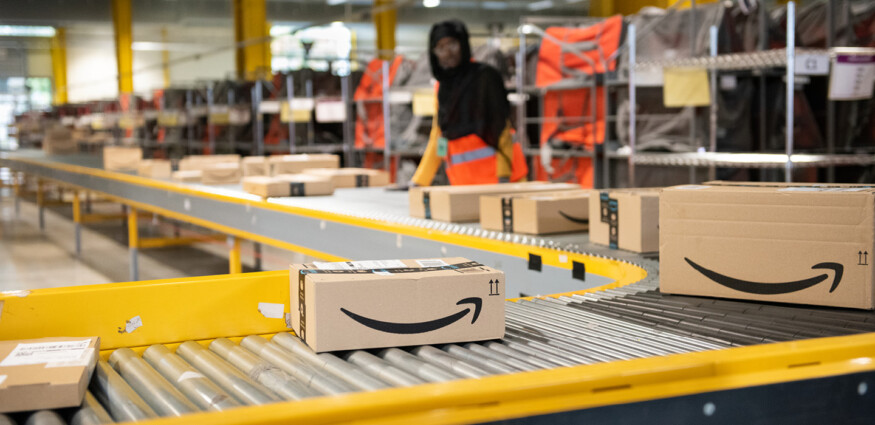Online trade is booming and more and more companies want to profit from it. But there are also great demands placed on online retailing. Many customers have already become accustomed to Amazon’s service and perceive this as standard. But for a small merchant who wants to set up an online business, this is not easily feasible. That is why more and more merchants are considering using the Amazon FBA fulfilment structures.
challenges. If you want to sell goods, you first have to store them. When orders are received, shipping must be organised as smoothly as possible. And when the goods reach the customer, merchants must also reckon with possible returns. Today’s customers expect responsive customer service. Last but not least, the movement of goods also raises VAT issues. With the Amazon FBA programme, merchants can transfer the complete handling of logistics to Amazon.
What is the FBA programme?
FBA stands for “Fulfillment by Amazon”. With this programme, Amazon offers a service especially for merchants. Those who offer their goods on Amazon can transfer the entire logistics to Amazon if they participate in the programme. The goods are thus stored and shipped by Amazon. Participation is not obligatory – merchants can also offer their goods for sale on Amazon and take over the logistics themselves. Which variant is best for the respective merchant becomes apparent when the advantages and disadvantages are weighed up.
Who can use the FBA programme?
Merchants who want to use the FBA programme must register accordingly. Amazon shows here step by step
- how companies register
- what costs are incurred,
- how shipping is handled by Amazon.
Companies that register for the FBA programme are often referred to as “FBA sellers”.
Participation in the FBA programme also incurs costs. Amazon offers various sales tariffs. With the “Professional” sales tariff, merchants currently (as of December 2021) pay 39 euros per month (excl. VAT), regardless of how many products are sold per month. In addition, a sales fee is charged per sale. In the “Single Seller” sales tariff, 0.99 euros is charged per item sold plus a sales fee.
Other fees may also apply. Amazon offers an overview of the different tariffs here.
Special aspects of FBA regarding taxation
What are the tax consequences of participating in the FBA programme? First of all, it must be noted that entrepreneurs participate in the FBA programme. Anyone who registers as a merchant with Amazon and thus acts as an entrepreneur must also register this with the tax office (if not yet the case).
Entrepreneurs must then fulfil various tax obligations, for example
- proper bookkeeping
- Determination of profits,
- submitting tax returns and tax registrations.
Merchants who use the Amazon FBA fulfilment structures are classified as entrepreneurs for tax purposes and must fulfil corresponding declaration obligations. Complex cases can arise, especially with regard to VAT.
VAT consequences for cross-border deliveries of goods
Goods are not always sold to customers only within Germany. Cross-border deliveries are also very common, especially in the area of e-commerce. However, this raises a number of questions in terms of VAT.
If goods are sold to private customers in another EU member state, then VAT must always be paid in this EU member state. In other words, the merchant would have to register in the EU Member State. Since 1 July 2021, an EU-wide delivery threshold of 10,000 euros applies. If this is not exceeded, taxation takes place in Germany.
But especially if merchants expect to exceed the delivery threshold, participation in the so-called One-Stop-Shop can simplify many processes. The merchant no longer has to register in different EU countries for VAT purposes, but can use the One-Stop-Shop (OSS) as a central point for all reporting obligations and payment obligations. Read more about the One-Stop-Shop.
However, anyone who uses the Amazon FBA fulfilment structures and therefore also Amazon warehouses in other EU member states must – despite the OSS – fulfil registration and declaration obligations in these EU member states. You can also find more information here.
Movement and transfer of goods
Especially in the context of the One Stop Shop, there are special cases when using Amazon FBA fulfilment structures. Here are some examples:
Case 1: The merchant is based in Germany and sells decorative items. He has registered for the OSS. He also participates in the FBA programme. The goods have been deposited by Amazon in a warehouse in France. A customer from France orders a vase. This is shipped by Amazon from the warehouse in France to the customer. This is therefore a local delivery in France and not a case for the OSS.
Case 2: This time a customer from Freiburg buys the vase. Since the warehouse in France has the shortest shipping route, Amazon ships the goods from this warehouse. The delivery is therefore made from France: The merchant must report this sale in the OSS.
Case 3: the merchant now also sells more and more decorative items to Austria. Amazon notices this development and therefore deposits more of the merchant’s products in a warehouse in Salzburg (Austria). The transfer of goods is irrelevant for the OSS, as there is no connection with a sale here. However, the intra-Community transfer must be declared in the tax return and a recapitulative statement. The merchant must be registered in Austria and have a valid VAT ID in Austria.
For merchants it can be an enormous challenge to distinguish when a transaction has to be recorded in the OSS or in a local tax return. The bureaucratic effort in accounting is very high without technological support.
VAT and invoicing
When goods are purchased, the customer usually expects an invoice to be issued for the purchase. The sales tax must also be shown correctly. Amazon offers a billing service for merchants in which the sales tax is already calculated by Amazon. The invoice is available to the merchant in his account. The invoices are automatically prepared electronically by Amazon and made available to the respective customer for download. Amazon provides detailed information on the invoice service. A sample invoice of what this looks like can be found here.
Of course, a fully automated invoicing service initially sounds like a welcome relief for merchants. However, the EU VAT system is so complex that the VAT is not always shown correctly when Amazon invoices. Different tax rates apply in the various EU member states. Standard tax rates, reduced tax rates or heavily reduced tax rates – Amazon cannot always fall back on the correct tax rates here. Even for tax experts, it is sometimes difficult to determine which tax rate should be applied. Merchants cannot therefore rely on the invoice service to ensure that everything will be correct: They must check the invoice accordingly, because the merchant is liable if the tax is incorrectly shown.
Pros and cons
If you think of e-commerce, you almost can’t avoid a provider like Amazon. Not least in times of the pandemic, Amazon was able to achieve record profits. Online trade is enormously successful – and understandably, smaller merchants also want to profit from it. But before a business registers for the FBA programme, advantages and disadvantages should be weighed up, such as the following:
Pros
- Amazon Marketplace reaches many potential customers.
- Shipping through Amazon qualifies for Prime FREE premium shipping. For Prime customers, shipping is then free.
- Merchants can grow (cost-effectively) across Europe.
- No need to implement their own customer service: Amazon customer service is available around the clock (in several languages).
- Returns are also handled via Amazon (although costs should be taken into account here).
- Merchants do not have to rent and maintain their own storage facilities.
Cons
- Merchants must ensure that sufficient goods are available.
- Complaints are costly for merchants.
- There are fees for the FBA programme.
- Especially for large products, storage and shipping fees can be significant. The price overview from Amazon provides an overview.
- Merchants need to protect themselves from VAT: Many cases are not easy to classify, especially in the context of OSS. Advice is needed here.
Conclusion
It can be very attractive for merchants to use the Amazon FBA fulfilment structures. However, it should be carefully examined what costs arise from the storage and shipping of the products. In addition, the VAT consequences are complex. Local registrations and declaration obligations must also be made when participating in the OSS. Merchants should seek tax advice and also consider technological support so that the declaration obligations can be handled properly and without too much effort.






